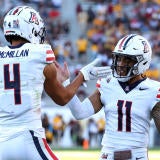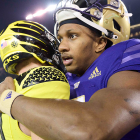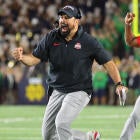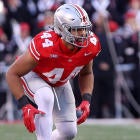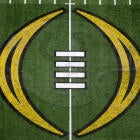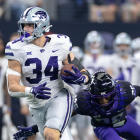
Michael Penix Jr. couldn't have known what he was getting into when the kid from Tampa, Florida, transferred from Indiana to Washington in December 2021. At that point, both player and program were shells of themselves.
Washington had just come off firing Jimmy Lake, who had allegedly mistreated players. Before that, Chris Petersen had brought the Huskies back to national prominence before abruptly retiring in 2019 citing anxiety and stress.
When Penix looked West in search of a new start, he was experiencing his own burnout.
"I don't know if everybody knows just how broken he was -- emotionally, physically, mentally checked out. Over," former Washington quarterback Brock Huard told CBS Sports.
Huard had a behind-the-scenes seat in production meetings as a college football analyst. While at Indiana, Penix had suffered four significant injuries in as many different seasons.
His national profile had risen briefly in 2020 during a pandemic-shortened 6-2 Hoosiers campaign. But laying his body on the line at IU resulted in significant pain in his knees and shoulders. Beyond body health, that wears on the mind, too.
"There were times when I'd wake up the day of the game, and I'd wait until my roommate leaves, and I'd just lie on the floor and I'd just cry to God just praying that he'd protect me that day," Penix told Pac-12 Network before the season. "I knew where my head was at that time."
It was that bad.
This week of the Oregon-Washington rivalry game, Penix is the leading figure in perhaps the biggest contest of the Pac-12's final season as comprised. His body and mind healed, Penix has become the Heisman Trophy favorite through six weeks. He's part of a vanguard of Pac-12 quarterbacks who have dominated the sport this season.
Penix is on his way to leading the NCAA in yards passing per game for the second consecutive season, something that has never been done at Washington. More than that, he put a program on his back -- perhaps unwittingly -- and led it back to prominence.
This time, injuries have not slowed him. His former Indiana offensive coordinator, Kalen DeBoer (now UW's coach) has surrounded him with NFL-quality offensive lineman. Wide receiver Rome Odunze leads the Pac-12. The rest has been up to Penix's left-handed gun-slinging.
"I don't think either thought it would turn out this good," said former Washington coach Chris Petersen, referring to DeBoer and Penix. "The thing that is so cool … these guys throw it down the field like nobody's business. It is super-efficient but not all RPOs and bubble screens. It is vertical and attacks teams."
Penix's presence also unlocks key mysteries of this rivalry. After 114 meetings, this is the first with both teams ranked among the top 10. Why the Ducks and Huskies haven't been this good at the same time goes back to the beginning of the country itself.
A quarter century after the American Revolution, the Pacific Northwest was just being discovered. In a way, the region wasn't on the map. It was a variation on a theme that resonates today. It's geography. It's topography. It's demography. It's history.
There is a certain amount of isolation in the Pacific Northwest. Washington became a state (1889) seven years before what is now the Big Ten was founded.
The essence of the rivalry continues to be the Huskies in big-city Seattle playing the Ducks from the Oregon hinterlands. Or at least that was the quintessence until 1994 when Oregon's Kenny Wheaton picked off Washington's Damon Huard -- Brock's brother -- and returned it for a touchdown to win the game.
"I can remember them getting into [my brother's] face and spitting on him and screaming at him," Brock Huard said. "[Oregon continued] to show the highlight on their screen for two decades afterward. This one has a lot of ties to the family."
That moment largely signaled to the world that Oregon had arrived in the rivalry -- supported by Nike founder Phil Knight's largesse. That got Oregon's Air Jordan foot in the door. The Ducks won 19 of the next 26 meetings over the once-dominant Huskies.
There has never seemed to be enough room for the Ducks and Huskies to be this good at the same time -- until now. There is that sense of isolation, at least in recruiting. Before Rich Brooks began to turn Oregon around in the 1990s -- handing things off to Mike Bellotti -- the program was largely a non-factor.
You don't just drive to Oregon and Washington. You fly over mountains, arrive by boat. Legendary Washington coach Don James used to say recruiting started for him by corralling the best players in the two states then going to California where more talent resided.
At least for now, the tables have leveled thanks to Penix and Oregon's Bo Nix. It is a quarterback legacy that falls to them now. Oregon's Akili Smith (1997-98) never lost to Washington. Neither did Heisman winner Marcus Mariota. Darron Thomas led the Ducks to BCS Championship Game following the 2010 season.
Washington's Billy Joe Hobert led the Huskies to their only national championship in 1991 (split with Miami), going 17-0 as a starter. Jake Browning (39-14 as a starter) led the Huskies to their only College Football Playoff appearance in 2016.
The Pac-12 found itself in a bad place over recent years when top West Coast talent left for the Midwest and South. It has taken the transfer portal to transform the league back. Nix, from Auburn, will tie the all-time record for career starts (53) on Saturday. That record is held by Browning and Northwestern's Clayton Thorson.
In 1 ½ seasons, Penix is already among Washington's winningest quarterbacks (17-2). But it's more than that. It's been an Emerald City takeover. Penix came for a football rebirth. He has become an NIL darling recently signing deals with Adidas and Alaska Airlines.
There's a reason for the NIL dollars. They're signing a winner. Since arriving, Penix has been sacked only 10 times in 732 pass attempts. UW matters again in Seattle where one of the most beautiful settings in the sport has one of the most productive offenses to go with it.
"I think he's the best pocket passer in college football," Petersen said of Penix. "I don't know how that translates to the next level, but he is a thing of beauty to watch … a pocket passer these days. He just executes that plan and turns it into a masterpiece."
The rivalry is about quarterbacks again. If Nix's numbers hold (80.4% comlpetions), he would set an NCAA single-season record. Penix is averaging 11.2 yards per attempt. That's currently No. 5 all-time. As the Pac-12 sorts itself out in its final season, these seem to be the two best programs.
New money and new technology has infused the rivalry. Seattle is a tech hub. Bill Gates lives near campus. Eugene, Oregon, is the hub of an athletic empire that powers all of college and pro sports. There is still plenty of animosity to go with which team emerges Saturday as the Pac-12 favorite.
"The history was pretty clear for 50 years," Huard said. "It was Washington [being] the big city, bigger money, bigger stadium, bigger everything. Once Nike got involved and success started to roll, they were the new money.
"It wasn't just a flash in the pan. It wasn't just a spoiled kid who spent the money. Dan Lanning could be just the right guy for the job, He has this country grit: toughness -- legit toughness -- not fake-guy toughness."
The matchup contains the tragedy and possibility of this rivalry. Penix (408 yards passing) led the Huskies to 10 points in the final 3 minutes to win last year at Oregon, 37-34. This is the teams' last regular-season meeting in the forlorn Pac-12.
Oregon and Washington -- perhaps both -- represent the league's best chance at breaking a six-year drought in the College Football Playoff. That's the longest dry streak in the CFP of any Power Five league.
The teams have met as ranked opponents only nine times, but this is the fourth such meeting in the last five years. This is also the first meeting of two Pac-12 teams at 5-0 or better in 19 years.
Going forward, there is the question of whether the rivalry will translate to the Big Ten. This game is a big reason why the teams are in the Big Ten. Rivalries sell. A year after the planned exodus of USC and UCLA shocked the world, Oregon and Washington were the next logical edition with the Pac-12 collapsing around them.
"They need each other," Petersen said. "It will be very interesting to watch going forward [saying], 'OK, we've been these fierce rivals, but we're also kind of on this island here in the West.'"











